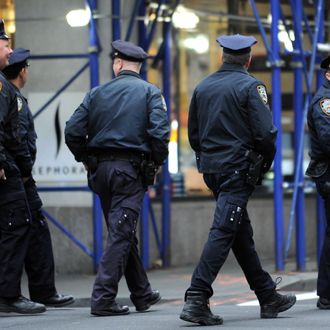
State Attorney General Eric Schneiderman promised during his campaign to look into “unjustified stop-and-frisk practices,” and according to the Daily News, he’s in the preliminary steps of following through. Schneiderman has reportedly convened a “working group” to analyze the data, which shows that 87 percent of the 685,724 people stopped last year were black or Latino, to the dismay of civil liberties groups and New York City’s men of color. The attorney general’s office has not yet called for a formal report, like the one issued in 1999 by Eliot Spitzer, but the discussion around the practice doesn’t seem to be going away.
Yesterday, NYPD Commissioner Ray Kelly insisted that stop-and-frisk is a “life-saving tactic.” But in New York this week, Chris Smith writes that it’s as much about stats as anything:
“There’s all this talk about stop-and-frisks, whether it’s racist or harassment, but the public totally misses the game,” a Brooklyn cop says. “You know all the guys in the neighborhood, and usually when we roll up they frisk themselves. That is, if it’s a night they don’t feel like being bothered, they just lift up their shirts when we stop, and then they move on. If they feel like making a point to the boys they’re hanging with on the corner, they won’t do it. But the people who carry guns and shoot each other where I work are not white. There are no white people to begin with! But I always laugh. The civil-liberties people are the reason we have stop-and-frisk reports in the first place. The theory was, if cops were forced to write down what they were doing, they wouldn’t be so haphazard about stopping people and frisking them. But because the department loves data, now those reports are activity that can prove you’re taking action at CompStat.”
In a New York Times column yesterday, reporter Michael Powell had still more startling anecdotal evidence: His two young adult (white) sons have never been frisked, while eight black students he asked from the Borough of Manhattan Community College had been searched a combined 92 times. Sometimes, they said, getting stopped comes with a shoe to the face.





























